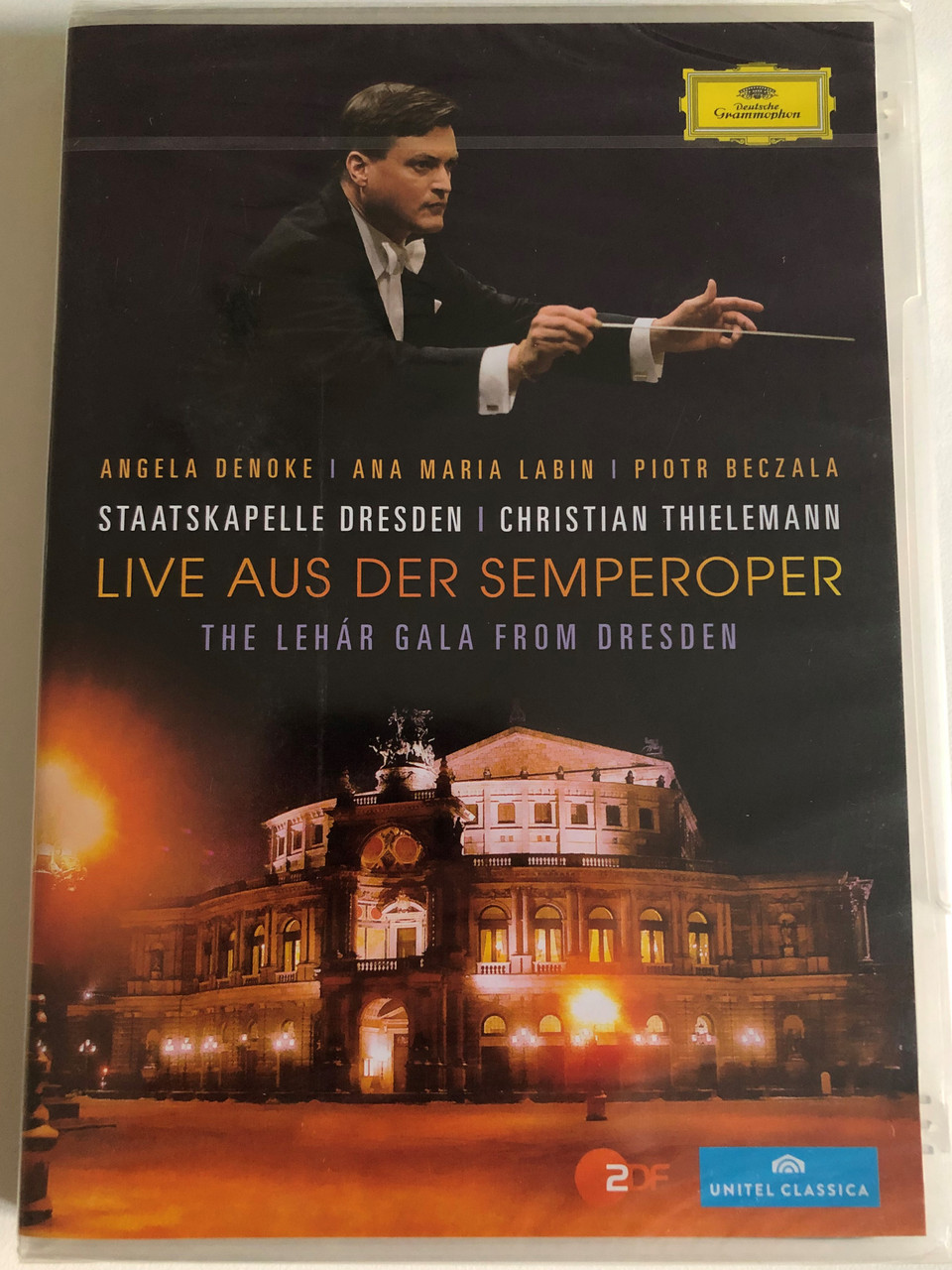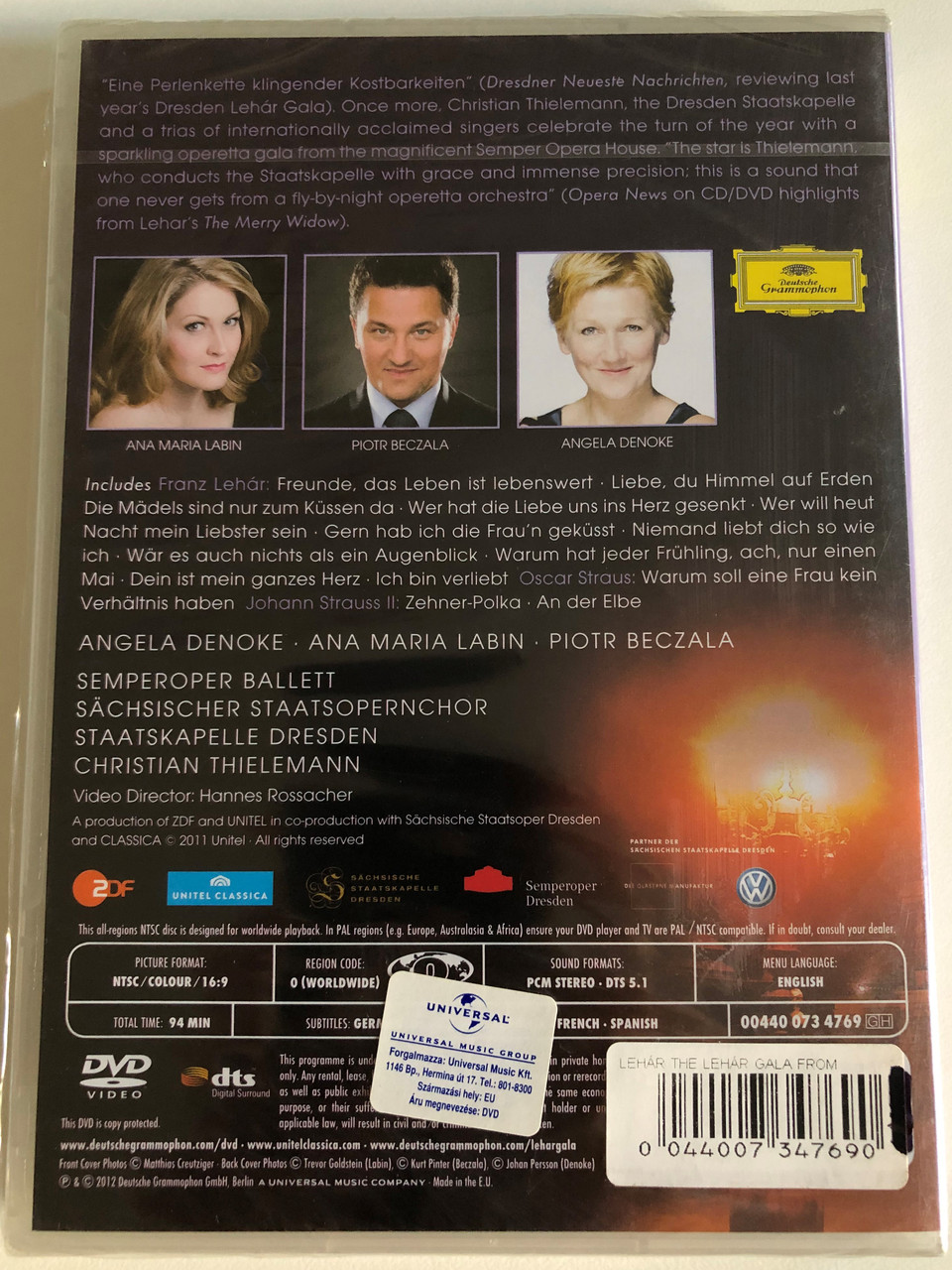Description
The Lehar Gala: Dresden State Opera / Thielemann / DVD 2012 / Made in the EU / Live Aus Der Semperoper
UPC 0044007347690
REGION 0 NTSC DVD
Christian Thielemann conducts a range of opera singers at the Lehar Gala in Dresden. Among the singers to appear are Angela Denoke, Ana Maria Labin and Piotr Beczala.
Product Key Features:
-
Format: DVD
-
Director: Christian Thielemann
-
Number of Discs: 1
-
Studio: Deutsche Grammophon
-
Movie/TV Title: Live Aus Der Semperoper: Lehar Gala from Dresden
-
Sub-Genre: Music Video (Concert/Performance)
-
Genre: Classical Composers
Christian Thielemann's affinity with the works of Beethoven, Bruckner and Wagner is so well known and his performances of their music so universally acclaimed that not a few observers were surprised when he turned his attention to the world of operetta at the 2010 New Year's Eve Concert. But a selection of numbers from Franz Lehár's classic operetta The Merry Widow allowed him to acknowledge an old love which he has felt since his early years as a conductor. This is firstrate music, he insists, yet it is some of the most difficult to perform because of its quintessential blend of sophistication and joviality. His plan worked out, and the New Year's Eve Concert from Gottfried Semper's opera house delighted audiences not only in Dresden but also others watching it on their television screens at home. According to the Dresdner Neueste Nachrichten, "seriousness of purpose and concentration on the music conspired with a very real delight in performing this music and even with a sense of risk to produce a veritable string of pearls, each of which was a musical jewel in its own right".
In the light of the success of the first New Year's Eve Concert from Dresden, it became clear that in 2011, too, Lehár's music should be central to the programme. After all, this music seems almost predestined for end-of-year festivities. The master of the Silver Age of Operetta is known not only for a musical language that shimmers with chic sophistication and infectious verve but also for holding up a mirror to society in works such as The Merry Widow, The Land of Smiles and The Czarevich, all of which reflect the ironies and ambiguities of that age. The presentage is called into question and the chaos that lies in wait just round the corner is tested in the form of a game - an ideal combination for New Year's Eve, when we leave the old year behind us and abandon ourselves to the euphoria of the moment in order to see the world with new eyes the very next day.
Such a delightful balancing act naturally requires top-flight singers and for his 2011 Lehár Gala, Christian Thielemann found them in Angela Denoke, Ana Maria Labin and Piotr Beczala. Denoke and Beczala are two of the most sought-after singers on the international stage today. And both have particularly expressive and brilliant voices. The young Romanian soprano Ana Maria Labin is still at the beginning of her international career but has already been acclaimed in The Merry Widow at La Scala, Milan. Joining them onstage is the Dresden State Opera Chorus, whose members have already demonstrated their gifts in the field of operetta in repertory performances for the company.
In advance of the concert, Thielemann said that he saw it as his duty "to free operetta from its musty reputation", and the programme for his New Year's Eve Concert offered the best possible preconditions for this, allowing us to admire Lehár as a composer of immense variety by featuring excerpts from early masterpieces such as Der Göttergatte, The Count of Luxembourg, Gypsy Love (a tribute to Lehár's Hungarian origins) and Eva alongside highlights from his later successes, Paganini, The Land of Smiles, The Czarevich, Friederike and his final work for the stage, Giuditta, which received its first performance at the Vienna State Opera in 1934 - the only operetta by Lehár to be premiered by the company. The programme includes not only hit numbers such as "Freunde, das Leben ist lebenswert", "Gern hab ich die Frau'n geküsst" and, as an encore, "Dein ist mein ganzes Herz" but also rarities and orchestral gems not often encountered in such altogether outstanding performances. These tenor hits have a particularly close connection with Dresden, for Lehár wrote them for Richard Tauber, who during the First World War held the title of "Royal Court Opera Singer" at the Dresden Opera before being launched on his international career.
History is an integral part of this New Year's Eve Gala from Dresden, notably in the soprano waltz "Wär es auch nichts als ein Augenblick" from the operetta Eva, a work that Lehár conducted at Dresden's Central-Theater in 1912, only months after its world premiere in Vienna. Only a year earlier, Richard Strauss's Der Rosenkavalier - a work equally beholden to the Viennese waltz - had received its first performance at the Dresden Court Opera. Like Lehár's operettas, it was viewed at the time as a nostalgic farewell to the fin de siècle. The encores at the 2011 New Year's Eve Gala featured works by two other composers whose names bear more than a passing likeness to that of Richard Strauss: Oscar Straus, who was the same age as Lehár, is represented by "Warum soll eine Frau kein Verhältnis haben" from his 1932 musical comedy Eine Frau, die weiß, was sie will (staged in Great Britain and Australia as Mother of Pearl), which, frivolous and witty by turn, was an international success in its day. The Golden Age of Operetta is represented by the Waltz King himself, Johann Strauss the Younger, who left his mark on the musical history of Dresden in more ways than one: the Zehner-Polka op. 121 was composed in 1852 "in honour of a party attended by ten people in Dresden", while On the Elbe op. 477 of 1897 was the last waltz that he ever wrote. This is also the work that ended the 2010 New Year's Eve Concert from Dresden and is already a practically obligatory encore designed as a tribute to Vienna, the home of the New Year Concert.
With this concert from Dresden Christian Thielemann has surely come a step closer to gaining a wider audience for operetta. But he has also come closer to another goal: the date at which he takes over as principal conductor of the Dresden Staatskapelle in September 2012, at which point we may well be justified in hoping that his much-lauded relationship with the orchestra will become a happy marriage.
























